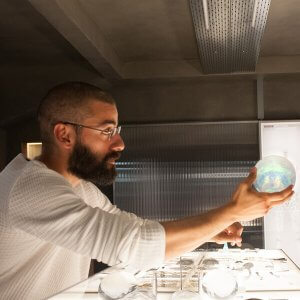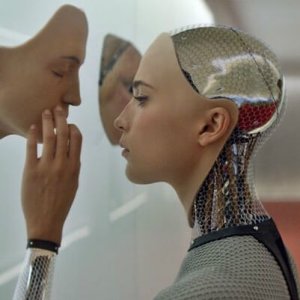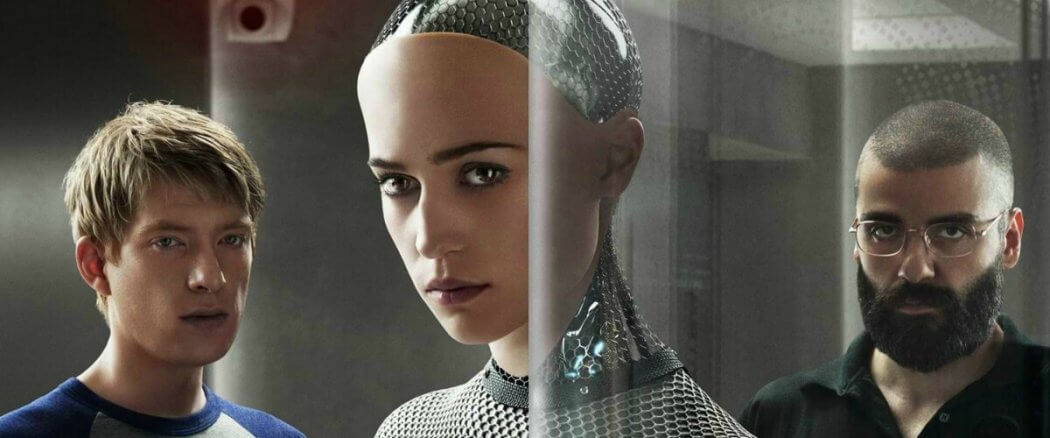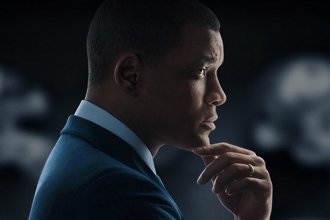What is it that makes us human? Our anatomy? Our emotions? Our morality? If all these things could be reproduced, what would be left to distinguish the artificial from the flesh and blood?
Those are the questions raised by writer/director Alex Garland’s new film Ex Machina. This is the latest addition in a long history of films about artificial intelligence, where our greatest innovations become our greatest threat.
Caleb is a programmer who receives the chance of a lifetime. He’s invited to spend a week at a secluded research facility to test out an invention that will change the world forever. The inventor is Nathan, a programming genius who founded the company where Caleb works. The invention is Ava: a machine that looks, thinks, and feels like a real human being. Caleb’s task is to test how human Ava really is. But in this new frontier, nothing is what it seems.
The Intelligence
The special effects in Ex Machina are outstanding. We live in the golden age of CGI. When filmmakers mix computer generated images with practical effects, the result is seamless. Whatever can be imagined, can now be filmed. Ava looks so real, you could reach out and touch her.
Alicia Vikander’s performance certainly helps. Vikander has a hard task. She needs to make Ava feel like a robot, while also passing as a human. She’s more than up to the challenge. Vikander works wonders with Ava’s facial expressions. When Ava looks at you, she’s flirtatious, perceptive, and creepy at the same time.
Domhnall Glesson, the lead in 2013’s About Time, plays Caleb. He’s a good “every man” which helps form a bridge for the audience. He embodies what we’re feeling at each new twist and turn. And his interactions with Ava are dynamite. The two have natural chemistry, and their conversations are fascinating.
These moments are enhanced by Garland’s understanding of mood. He knows how to build suspense, and how to break the ice. He knows when to tease, and when to reveal. He also has an ear for a great soundtrack. The result is a potent atmosphere of awe and dread.
The Artificial
Garland teases out a number of provocative questions in Ex Machina. Unfortunately, few of them are explored with real depth. This is a film that should have reveled in the esoteric. This isn’t a big budget feature with box office expectations. This is a small film that seemed tailor made for challenging dialogue and complex ideas. We get some, to be sure, but Garland deflects every time things get interesting. It’s as if he’s dumbing down for the masses that aren’t even there.
 Part of the problem lies in Oscar Isaac’s portrayal of Nathan. On paper, Nathan is a great character. This is an egomaniac billionaire that likes to pretend he’s God. But on screen, he’s just a normal guy that says “dude” a lot. He lacks gravitas.
Part of the problem lies in Oscar Isaac’s portrayal of Nathan. On paper, Nathan is a great character. This is an egomaniac billionaire that likes to pretend he’s God. But on screen, he’s just a normal guy that says “dude” a lot. He lacks gravitas.
Great supporting roles grab you from minute one and never let go, like J.K. Simmons in last year’s Whiplash. The little nuances and quirks of a complex character are missing in Nathan, which is strange since that’s exactly what Isaac specializes in. He doesn’t phone it in by any means, but this character only skims the surface of his talent.
I was also disappointed in Garland’s aesthetic choices. The film is broken up into sections with title cards that feel out of place. And his selections of shots, visual tones, and sets feel more static than usual in our era of dynamic filmmaking.
Don’t get me wrong, this is a good movie. All of the right ingredients are here. They just don’t come together fully in the end. And sometimes that’s more disappointing than if they hadn’t been there in the first place.
The Inevitable
Will artificial intelligence exist someday? The prospect seems inevitable. Technology is advancing at lightning fast speed. We already have Siri on the iPhone. It’s not too hard to imagine a Siri of 2115 that looks like Ava.
And if we’re honest, the prospect is tantalizing. Imagine a robot that looks like a supermodel. She’ll clean your house, cook your food, and cater to your every whim. But how much control are we willing to give her? Even with the most vigilant safeguards, computers always have glitches. Do we want a robot rocking our baby to sleep? And what if the machines become smart enough to not want to be our slaves anymore?
Welcome to the robot apocalypse.
The God From the Machine
Deux Ex Machina is a Latin phrase that means “god from the machine.” In Greek tragedies, the gods would be dropped off on stage by cranes to resolve all the conflicts in the play. Today, the phrase is shorthand for cheating, when writers bring in an outside element to solve every problem in their story.
“Deux” is missing from the title of Ex Machina. God has been left out of our machine building too. We don’t need God anymore, because we’ve become God. This sin stretches all the way back to Adam. There’s just one problem: we’re terrible at playing God.
Look at technology. We create with no thought to the consequences. Full speed ahead. But what are those screens doing to our eyes? What are those cell phones doing to our brains? What is social media doing to our relationships? We’re the guinea pig generation. The studies won’t be out for another few decades. By then, it will be too late.
 Nathan says something remarkable in Ex Machina. He tells Caleb that one day humans will be extinct, and robots will dig up our remains like we dig up fossils. Nathan knows he’s creating something that has the potential to end humanity, and yet he goes on creating because if he doesn’t, someone else will. He wants to be the one to do it first. That’s pride, and pride always lead to a fall.
Nathan says something remarkable in Ex Machina. He tells Caleb that one day humans will be extinct, and robots will dig up our remains like we dig up fossils. Nathan knows he’s creating something that has the potential to end humanity, and yet he goes on creating because if he doesn’t, someone else will. He wants to be the one to do it first. That’s pride, and pride always lead to a fall.
The question is: how far will God allow our fall to be? I don’t think we want to find out. Think of the falls God has allowed throughout history. Israel was decimated. Rome was destroyed. Wars have been fought. Holocausts have come. Maybe God will allow our worst fears to be realized. Maybe cell phones really are giving us cancer. Maybe Facebook really is destroying our families. Maybe the robots will take over the planet.
If that happens, movies like Ex Machina will loom large as prophetic voices from the past. And then the world will know what Christians know now. Only God can fix a mess this big. That’s not cheating. That’s the Gospel.
Deux Ex Machina.





